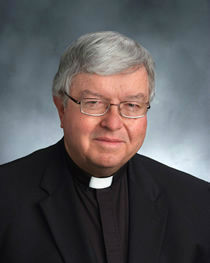
Faith
Whenever circumstances make it impossible or unwise to go to church -- illness, caring for a sick child, a non-negotiable work assignment, etc. -- your Sunday obligation is simply lifted.

Doyle
Q. Due to COVID-19 and restrictions to prevent its spread, public Masses are currently suspended in our diocese. If I "attend" a livestreamed Mass on television during this time, have I fulfilled my Sunday obligation? (By not participating at all, I feel as if I am falling away -- and it is becoming much too easy to enjoy this "time off.") (Richmond, Virginia)
A. No, you have not fulfilled your Sunday obligation by watching Mass on television. But not to worry -- in your case, you have no obligation! During the coronavirus pandemic, Richmond -- like many dioceses -- has simply lifted the responsibility of Catholics to attend Mass. (The Archdiocese of Washington says on its website, "The right thing to do is to stay home for your safety and the safety of others.")
Whenever circumstances make it impossible or unwise to go to church -- illness, caring for a sick child, a non-negotiable work assignment, etc. -- your Sunday obligation is simply lifted. But what you should still do is to try to make Sunday special.
The bishop of the Diocese of Spokane, Washington, for example, wrote that during the coronavirus, "Those members of the faithful who do not attend Sunday Mass should devote some time to prayer on the Lord's Day, either alone or as a family."
Many parishes and dioceses have offered suggestions as to how that might be done -- watching a televised Mass, looking over the Sunday readings in advance, praying the Our Father and offering prayer intentions aloud as a family.
During a weekday televised Mass from his residence in March, Pope Francis suggested that viewers who find themselves unable to receive the Eucharist during the coronavirus make a "spiritual Communion," and he offered the following text:
"My Jesus, I believe that you are present in the most holy sacrament of the altar. I love you above all things, and I desire to receive you into my soul. Since I cannot at this moment receive you sacramentally, come at least spiritually into my heart. I embrace you as if you were already there and unite myself wholly to you. Never permit me to be separated from you."
Q. When I was a Protestant, I never went to confession, and no such practice existed in any of the churches to which I belonged over the years. Now, as a Catholic, I've been told that confession is based on a passage in the Letter of James (5:16) that says, "Confess your sins to one another."
But that verse to me seems more like a general instruction to admit it when we've done a person some wrong and ask each other's forgiveness than it does a mandate to have a confessional in every church. Can you explain? (New Middletown, Indiana)
A. I have always learned that the Church's power to forgive sins was based primarily on a different scriptural text from the one you cite. This passage comes from the Gospel of John (20:22-23); on the night of the resurrection, when the risen Jesus appeared to the apostles who were huddled in fear, he said to them, "Receive the Holy Spirit. Whose sins you forgive are forgiven them, and whose sins you retain are retained."
The exact form in which that forgiveness is dispensed has varied considerably over the years, as detailed in the Catechism of the Catholic Church (No. 1447). In the early centuries, reconciliation for particularly grave sins consisted of a one-time-only public profession of guilt and a course of manifest penance, sometimes for a number of years, before readmission into the eucharistic community of the Church.
During the seventh century, Irish missionaries brought to the European continent the practice of the private confession of sins to a priest, opening the way to the regular use of the sacrament for both mortal and venial sins -- and this has continued as the basic structure of the sacrament up to the present day.
- Father Kenneth Doyle is a columnist for Catholic News Service
Recent articles in the Faith & Family section
-
Did you know?Father Robert M. O'Grady
-
Sowing the Seeds of FaithMaureen Crowley Heil
-
Bread left overScott Hahn
-
Scripture Reflection for July 28, 2024, Seventeenth Sunday in Ordinary TimeJem Sullivan
-
What the universal call to holiness entailsDr. R. Jared Staudt





